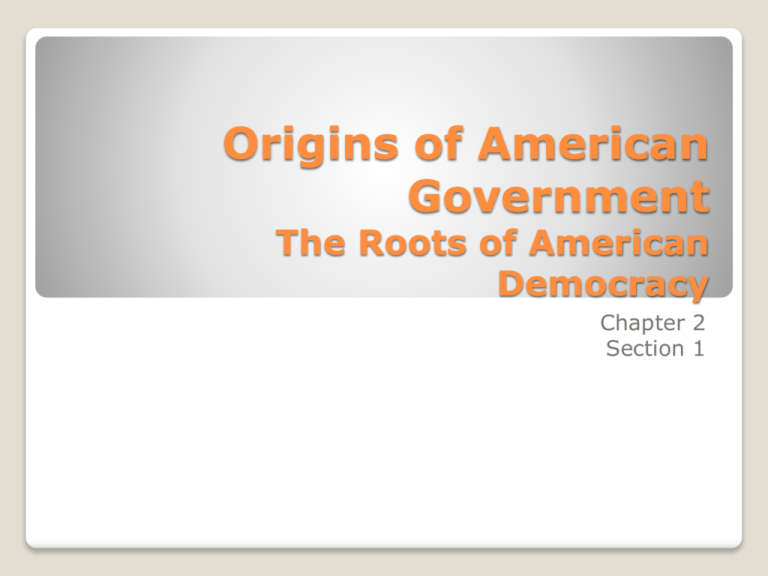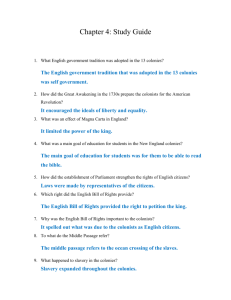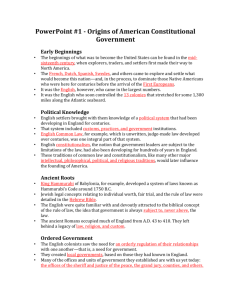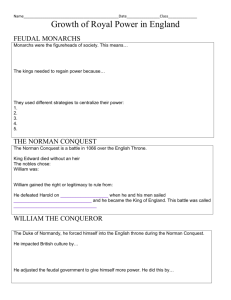Origins of American Government The Roots of American Democracy
advertisement

Origins of American
Government
The Roots of American
Democracy
Chapter 2
Section 1
The Roots of American Democracy
Main Idea
American democracy was shaped by our English political heritage, colonial
experiments in self-government, and a range of intellectual influences.
Reading Focus
• Which American political ideas derived from an English political heritage?
• How did colonial governments give English colonists experience in selfrule?
• What intellectual influences shaped the development of American political
philosophy?
English Political Heritage
Colonial government would never be an exact copy of the British system.
Colonial leaders adapted old ideas, based on English traditions, to a new
environment.
Representative Government
• Tradition began in 11th century.
• Evolved into bicameral, or twochamber, legislature
• Nobles comprised Upper House.
• Local representatives participated
in House of Commons.
Limited Government
• Began in 1215 when King John
signed Magna Carta
• Moved from rule of man to rule of
law
• Outlined individual rights which
king could not violate
• Included taxation and trial
provisions
English Political Heritage
{continued}
Individual Rights
• 1628: King Charles required to sign Petition of Right
• Required monarchs to obtain Parliamentary approval before levying new
taxes, also could not unlawfully imprison people or establish military rule
during times of peace
• Extended conflict between Charles and Parliament erupted into civil war
in 1642.
• Charles defeated, beheaded
• 1685: renewed conflicts and rebellion between the Crown and Parliament
• 1689: William and Mary chosen to rule, but had to govern according to
statutes of Parliament
• 1689: English Bill of Rights passed
• Free speech and protection from cruel and unusual punishment
guaranteed
• Glorious Revolution established constitutional monarchy.
Govt.2a
Govt.2b
The United States constitutional system incorporated ideas from the Magna
Carta, the English Petition of Rights, and the English Bill of Rights.
Magna Carta
Limited power of the
government
Fundamental rights
Trial by Jury
Due Process of the
law
English Bill of Rights
Limited power of the monarch
No standing army in peacetime
Free elections
Right of petition
Parliamentary checks on power
English Petition of Rights
Early document supporting idea that
men have rights and establishing
concept of rule of law
Included basic rights
Guarantee of trial by jury
Protection against marshal law
Protection against quartering of
troops
Protection of private property
The student will demonstrate knowledge of the political philosophies that shaped the development of Virginia and United States
constitutional governments by:
b) explaining the influence of the Magna Carta, the English Petition of Rights, and the English Bill of Rights.
The English Colonies
English colonists began to settle parts of North America in the early 1600s,
bringing English political theories and methods of governance.
Experiments in Early Governance
• Virginia was the first colony, founded
in 1607
• Jamestown’s House of Burgesses,
1619
• Mayflower Compact, 1620
• Fundamental Orders of
Connecticut, 1639
• Massachusetts Body of Liberties,
1641
• Each charter guaranteed colonists
the “rights of Englishmen.”
• PA granted to William Penn, 1681
• Georgia final colony, 1733
Types of English Colonies
• Three types established
• Proprietary, based on land grant to
individual or group
• Royal colonies, directly controlled
by king through appointed governor
• Charter colonies, operated under
charters agreed to by colony and
king; had most independence from
the Crown
Intellectual Influences
• In addition to English traditions, ideas were key to transforming loyal
English colonists first into revolutionaries and then into founders of a new
nation.
Republicanism
• Idea of representative government going back to Greece and Rome
• Highly values citizen participation, public good, civic virtue
• Influences included Aristotle, Machiavelli, de Montesquieu, others
Judeo-Christian Influences
• Religious heritage common to both Christianity and Judaism
• Law and individual rights of divine origin
Intellectual Influences
Enlightenment Thinkers
• Enlightenment—Intellectual movement in 18th century Europe
• Classical liberal concerns addressed in Enlightenment
• Framers of U.S. Constitution believed in people’s natural rights to life,
liberty, and property.
• Social contract—People form a government to protect their rights
• Philosophers John Locke and Jean-Jacques Rousseau important
contributors
• Economic and civil liberties important as well
• Other influences included Adam Smith, Voltaire, William Blackstone.
Vocabulary
Bicameral
two-chamber
Magna Carta
an English document signed by King John in 1215
that instituted that “rule of law” and protected
certain individual rights
Petition of Right
an English document signed by King Charles in
1628 that required monarchs to obtain
Parliament’s approval before levying new taxes
and said that monarchs could not unlawfully
imprison people, force citizens to house soldiers,
or establish military rule during times of peace
English Bill of Rights
an English document passed by Parliament in
1689 that limited monarchs’ power to enact laws,
raise taxes, or keep an army without Parliament’s
consent; guaranteed Parliament the privilege of
free speech; and gave all people protection from
cruel and unusual punishment
Fundamental Orders of Connecticut
a 1639 set of laws that limited the power of the
government and gave all free men the right to
choose the people to serve as judges
Proprietary Colony
a colony based on a grant of land by the English
monarch to a proprietor
Royal Colonies
colonies directly controlled by the king through an
appointed governor
Charter Colonies
colonies operated under charters agreed to by the
colony and the king






